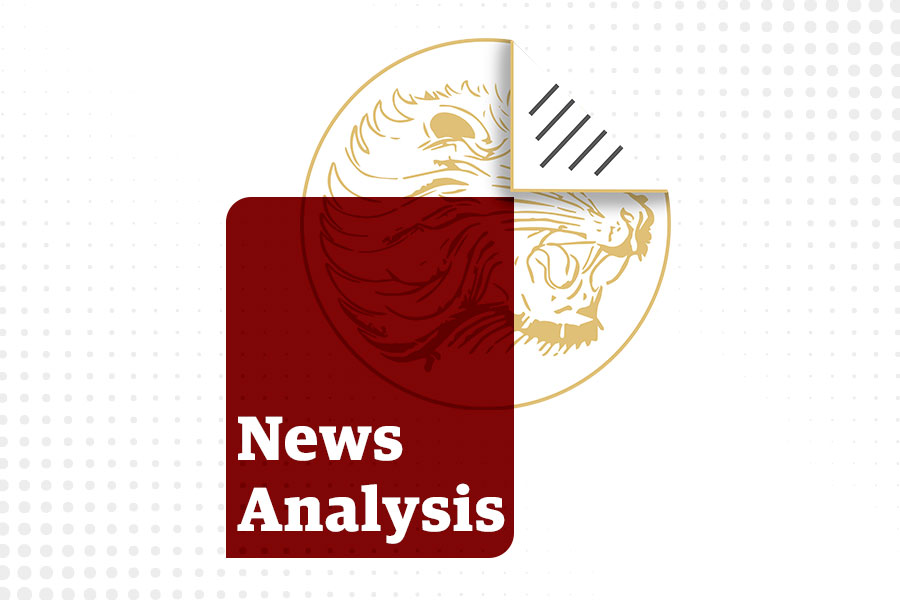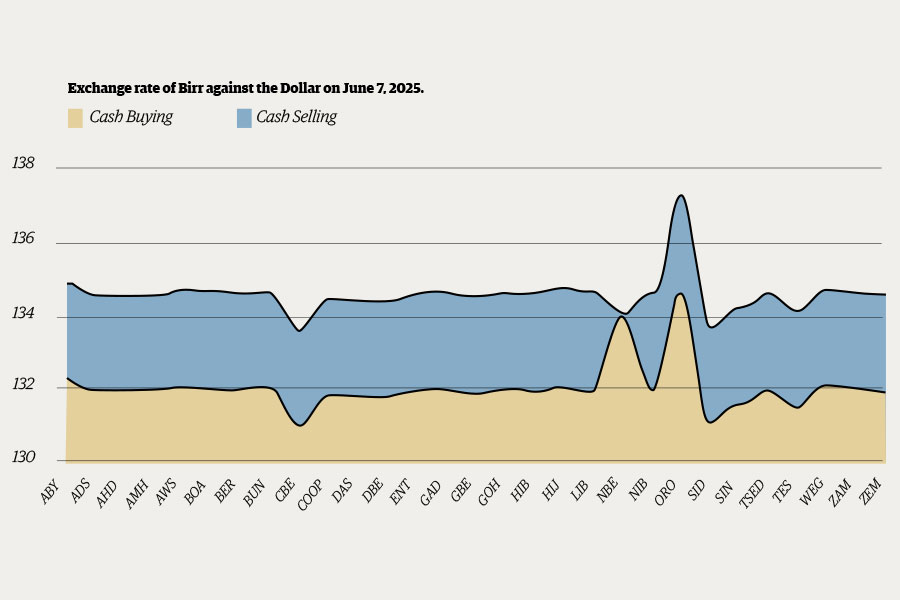
Sunday with Eden | Jun 22,2024
Last week was not business as usual for the TPLF - a senior member of the coalitions in the ruling EPRDF. The party lost the support of its allies on its stand in parliament to stop the establishment of the Administrative Demarcations & Identity Issues Commission.
In parliament, the trend of the legislative body was to approve any legislation without much debate or presentation. Most of the bills submitted to parliament, represented by four coalition parties and its allies, usually receive unanimous approval due to the party’s leadership role and its political culture of democratic centralism - deciding centrally and binding all members.
Out of 350 members, who attended the Thursday session, the entire opposition against the establishment of the commission, 33 votes, came from TPLF MPs, who opposed the bill on the grounds of its “unconstitutionality”.
All TPLF MPs raised their hands in unison from the right side of parliament, voting to stop the formation of the Commission.
Represented with 38 seats in the legislative body, the TPLF members voted together absent of former government whips Asmelash W. Selassie, Getachew Reda, Abay Tshaye, Debretsion G. Micheal (PhD), Abraham Tekeste and Addisalem Balema (PhD), who were not in attendance.
Drafted by the Office of the Prime Minister, the proclamation was tabled to parliament for legislation after it was unanimously approved by the Council of Ministers, which includes two members from TPLF.
Apparently, and signaling the winds of change in parliament, the vote was not unanimous and the customary adherence to democratic centralism seems to have vanished.
Kjetil Tronvoll, professor of peace and conflict studies, a political anthropologist and an African political analyst, shares this view.
“The contested Border & Identity Commission passed against TPLF votes ........ which signals breach of EPRDF coherence on the core policy issue,” he tweeted immediately after the bill passed the parliamentary vote receiving 313 voters in favour.
The legislation experience of the Commission proclamation is one of three recent incidents in parliament where the current administration faced opposition votes.
The other two cases where opposing votes were registered was during legislation to enact a driving license law and the imposition of the emergency decree in the pre-Abiy era. Those two votes received 69 and 88 opposing votes, respectively.
In the past two incidents, the naysayers are also from a single party, which vigorously lobbied and voted against the bills raising technical issues and effects of the bills, rather than constitutional questions, as in the current case.
The new establishment of the Commission is against the Constitution as it will have the same responsibility with the House of Federation, according to Atsebeha Aregawi (MP-TPLF).
The core duty of the new Commission, which will be reporting to the Office of the Prime Minister, will be providing alternative recommendations to the House of the Federation and the Prime Minister by studying problems and conflicts related to the administrative boundaries demarcation and issues of identity.
Its additional roles include collecting public opinion on issues of administrative boundaries, preparing a strategy and detailed plan, initiating the policy framework of administrative boundaries and facilitating ways in which conflicts that arise over administrative boundaries can be resolved. All these assessments and recommendations will be forwarded to the parlament and Prime Minister for decisions.
It is not the first time where such institutions have been established in the country. During the Dergue, there was the Institute for the Study of Ethiopian Nationalities formed in 1983 as a political research bureau to conduct research work as an input for a draft constitution. One among the six divisions under the Institute was a unit that studied the ethnic demographics of the country for the first time.
Atsebeha argues that the House has efficiently resolved about 20 issues that were raised on the same topics. One of the cases, he mentioned is the referendum held for the issue of the Silt’e ethnic group who had split from the Gurage Zone.
Raising this issue, TPLF members resisted the legislation of the bill, which was debated for nearly an hour. The fact that the legislation was not tabled for public discussion, comments from regional states were not solicited and an argument that the bill contained contradictory articles to the constitution were some of the concerns raised by the TPLF MPs.
Though addressing these issues is the main duty of the House of Federation, the house is not addressing many other pressing issues, according to Tesfaye Daba, chairperson of parliament’s Foreign Relation & Peace Affair Standing Committee, which reviewed the proclamation before it was brought back for legislation. Tesfaye also told MPs that the House was not quick and responsive on such happenings and that the Commission’s primary role is in helping the House.
“The recent recurring administrative border issues is the major cause of the formation of the Commission,” Tesfaye told Fortune. “These disputes are causes of instability in the country.”
Atsebeha of TPLF begs to differ on the cause of the instabilities in the country.
“Instabilities caused by administrative demarcation and identity issues are becoming common as the government is failing to uphold the rule of law,” Atsebeha argues.
Another MP believes that the commission will play a significant role in alleviating the immediate problem in the country, internal displacement.
“Most of the internal displacement is occurring after conflicts aggravated by identity issues rise,” Nasir Kansu (MP-SEPDM) said. “Even in my origin weredas, about 26,000 people are displaced and living in forests.”
Ethiopia is one of few countries experiencing large numbers of internal displacement – 2.6pc of its population, or 2.8 million people, meet this category. Nearly 1.4 million new internal displacements were documented in the first half of this year, surpassing both Syria and the Democratic Republic of Congo.
Atsebeha says that the government could address all the issues by enhancing the capacity of the House rather than forming a new body.
Mehari Taddele (PhD), an expert in public administration, policy and management, also believes that establishment of the Commission will undermine the house of Federation and the constitutional inquiry.
“A commission....... answerable and reporting to the apex of the executive, issuing non-binding recommendations on matters of constitutions exclusively under a mandate of the House of Federation, cannot be dismissed as mere advisory,” twitted Mehari.
Gebru G.Selassie, communications director of the House of Federation, argues that the House is undertaking its responsibilities efficiently.
“The House is not incapable even if we still need to do a lot,” Gebru told Fortune.
Hence, Million Assefa, former MP and member of the Council of Constitutional Inquiry under the House of Federation, believes that the establishment of the commission has got nothing to do with the constitutional issues.
“Parliament can form any commission that will facilitate and assist its duties,” said Million. “The Commission will be an assistant to the House not a rival against it.”
PUBLISHED ON
Dec 27,2018 [ VOL
19 , NO
974]

Sunday with Eden | Jun 22,2024

News Analysis | Mar 09,2024

Money Market Watch | Jun 08,2025

Fortune News | May 23,2020

Fortune News | Feb 03,2024

Dec 22 , 2024 . By TIZITA SHEWAFERAW
Charged with transforming colossal state-owned enterprises into modern and competitiv...

Aug 18 , 2024 . By AKSAH ITALO
Although predictable Yonas Zerihun's job in the ride-hailing service is not immune to...

Jul 28 , 2024 . By TIZITA SHEWAFERAW
Unhabitual, perhaps too many, Samuel Gebreyohannes, 38, used to occasionally enjoy a couple of beers at breakfast. However, he recently swit...

Jul 13 , 2024 . By AKSAH ITALO
Investors who rely on tractors, trucks, and field vehicles for commuting, transporting commodities, and f...

Jun 28 , 2025
Meseret Damtie, the assertive auditor general, has never been shy about naming names...

Jun 21 , 2025
A well-worn adage says, “Budget is not destiny, but it is direction.” Examining t...

Jun 14 , 2025
Yet again, the Horn of Africa is bracing for trouble. A region already frayed by wars...

Jun 7 , 2025
Few promises shine brighter in Addis Abeba than the pledge of a roof for every family...